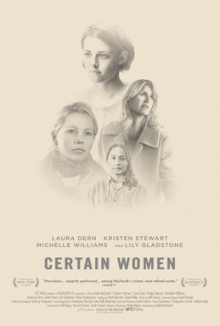I do so love the films of Kelly Reichardt and though this one is set in Montana instead of Oregon as with most of her work, it’s not any less good. This consists of three individual stories of different women, adapted from short stories by Maile Meloy. As always, there is so much depth and understated emotion in the characters, different as they each are, through the landscape of Montana adds an element of isolation to all of them. Without being able to focus on one specific protagonist here, the emotional impact is more muted than something like Old Joy but every story is strong and enjoyable.
A lawyer in Livingston, Montana, Laura Wells is exasperated by a troublesome client Fuller who is trying to sue his former employer. She arranges a second opinion from another lawyer at a neighboring town who repeats the same conclusion that she has been telling Fuller for months. He accepts the second opinion from the male lawyer and later breaks into the office of his former employer. Meanwhile Gina and Ryan are a married couple who are camping with their teenage daughter. Gina is an active person, a doer and apparently owns the business Ryan works for. She wants to buy a pile of sandstone blocks from an elderly neighbor Albert to build her dream countryside home. She ropes in Ryan to help but Albert seems more willing to talk to Ryan and their daughter resents being forced to go on the trip. Finally Jamie works on a ranch tending to horses. On a whim, she follows a group of older people into a classroom at night where they are attending a course on education law. The class is being taught by a newly graduated lawyer Beth who took the job without realizing that it’s a four-hour commute. Out of loneliness, Jamie tries to reach out to her to be friends.
There’s a hostage situation in the first story but for the most part, nothing much happens in all three stories. All of the richness lies in the subtle interplay between the characters and what it reveals about their selves, the roles they play and what they each want. Jaime’s loneliness and desperate need to connect to someone is the most easily understood and acute. Yet even in her story we can see Beth’s uncertainty about what it is Jaime wants or expects from her or whether they even have anything in common. Gina’s story is really quite subtle, being a more ambitious woman who knows what she wants and unapologetically goes for it, Yet her drive seems to alienate her from her husband and daughter and even Albert seems suspicious about her business-like manner of doing things. Ryan’s casual line telling her not to work so hard when everyone is relaxing during a barbecue and watching sports on the television is so telling. Gina instead seems to find satisfaction in serving everyone food and that she is making progress in the construction of her dream house. This is exactly the kind of understated storytelling I enjoy so much in the films by Reichardt.
The flat landscape of Montana with the mountains looming far off in the distance is omnipresent as Livingston seems small enough that you can see the countryside in most shots even on its main street. Gina loves the outdoors and is intent on obtaining that particular pile of rocks because it used to be part of a pioneer schoolhouse. On the ranch Jamie is surrounded by animals but is starved of human contact. One common thread running through these stories is distance between people and the isolation and sheer scale of the geographic features of the state emphasize that distance. The shots of the landscape are gorgeous of course but what I really appreciate here is that it’s never scenery porn. Instead it’s a natural part of the backdrop in the lives of these characters and that makes it feel more genuine than something that is presented as a showcase and that we have to go out of our way to notice.
So far none of Reichardt’s films have disappointed me. Her minimalistic style and sense of restraint is so much more appealing to me than directors who need to ramp up the drama and exaggerate the emotions their characters are experiencing. This quiet style also leaves space for the characters to feel more than just one thing at a time and to explore feelings that need not be overwhelmingly intense. I’ve stated before that Reichardt is probably my favorite director right now and that continues to be the case so far.
